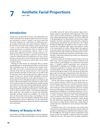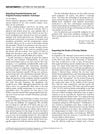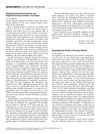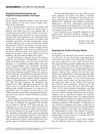 1 citations,
October 2023 in “International journal of Ayurveda and pharma research”
1 citations,
October 2023 in “International journal of Ayurveda and pharma research” Herbal medications might be safer and more effective for hair loss than synthetic treatments.
 1 citations,
August 2020 in “Food Research”
1 citations,
August 2020 in “Food Research” Plant extracts like Avicennia marina, Boehmeria nipononivea, and Camellia sinensis could potentially treat hair loss with fewer side effects than synthetic drugs.
 1 citations,
January 2016 in “Georg Thieme Verlag eBooks”
1 citations,
January 2016 in “Georg Thieme Verlag eBooks” The document concludes that ideal facial proportions are guided by specific measurements and symmetry to enhance beauty, but individual characteristics must be considered.
 1 citations,
December 1999 in “Dermatologic Surgery”
1 citations,
December 1999 in “Dermatologic Surgery” Propofol-ketamine and propofol-fentanyl are effective and safe for cosmetic surgery sedation.
 January 2024 in “International journal of homoeopathic sciences”
January 2024 in “International journal of homoeopathic sciences” Early intervention and patient education are crucial for managing alopecia areata.
 January 2018 in “Springer eBooks”
January 2018 in “Springer eBooks” Men and women need different facial rejuvenation treatments due to distinct aging processes and anatomical differences.
 May 2007 in “Dermatologic Therapy”
May 2007 in “Dermatologic Therapy” Hair care practices like using relaxers and tight braiding can lead to permanent hair loss in black women.
 September 2003 in “Clinics in Family Practice”
September 2003 in “Clinics in Family Practice” Different hair diseases affect people during childbearing years, with treatments ranging from medication to psychological support.
 December 1999 in “Dermatologic Surgery”
December 1999 in “Dermatologic Surgery” Indonesia's dermatologic surgery training program aims to improve patient care by educating skilled surgeons.
 December 1999 in “Dermatologic Surgery”
December 1999 in “Dermatologic Surgery” Experts discussed sedation, hair transplant techniques, and called for respectful professional communication.
1 citations,
January 2022 in “Annals of Dermatology” Dutasteride is more effective than finasteride for long-term hair growth in men with androgenic alopecia.
 September 2023 in “Clinical, Cosmetic and Investigational Dermatology”
September 2023 in “Clinical, Cosmetic and Investigational Dermatology” Higher SHBG levels are linked to less severe hair loss in women, but vitamin D levels don't seem to affect hair loss.
 September 2023 in “Authorea (Authorea)”
September 2023 in “Authorea (Authorea)” Certain peptides, caffeine, taurine, and an iron complex may improve hair regrowth when used with minoxidil and finasteride for hair loss.
November 2022 in “Annals of Translational Medicine” Immune activities and specific genes are important in male pattern baldness.
 14 citations,
April 2021 in “Heliyon”
14 citations,
April 2021 in “Heliyon” Pomegranate leaf extract may help with hair growth, dandruff, and lice.
13 citations,
January 2019 in “Indian Journal of Dermatology” Men with early-onset hair loss have more heart disease risk factors.
 July 2024 in “Journal of Cosmetic Dermatology”
July 2024 in “Journal of Cosmetic Dermatology” Rose stem cell exosomes can significantly improve hair growth in androgenetic alopecia.
 September 2023 in “Skin Research and Technology”
September 2023 in “Skin Research and Technology” The paper suggests a way to diagnose male hair loss and check treatment results using a dermoscope at four specific scalp points.
 May 2024 in “Clinical Cosmetic and Investigational Dermatology”
May 2024 in “Clinical Cosmetic and Investigational Dermatology” Manipulating cell cleanup processes could help treat hair loss.
 6 citations,
January 2016 in “International Journal of Trichology”
6 citations,
January 2016 in “International Journal of Trichology” The conclusion is that more hair loss (androgenetic alopecia) is linked to larger prostate size, suggesting hair loss could be an early sign of benign prostatic hyperplasia.
 June 2024 in “Computational and Structural Biotechnology Journal”
June 2024 in “Computational and Structural Biotechnology Journal” Multi-omics techniques help understand the molecular causes of androgenetic alopecia.
10 citations,
July 2015 in “International Journal of Trichology”  5 citations,
September 2017 in “Plastic and Aesthetic Research”
5 citations,
September 2017 in “Plastic and Aesthetic Research” Low dose cyclical nutrition therapy can consistently and safely improve hair growth and density without needing anti-androgens.
5 citations,
September 2022 in “Facial Plastic Surgery & Aesthetic Medicine” Facial feminization surgery helps make facial features more feminine, improving patient satisfaction and safety.

Taller men are seen as more attractive, and hair loss negatively affects attractiveness.
 November 2024 in “Journal of Clinical Medicine”
November 2024 in “Journal of Clinical Medicine” The treatment improved hair thickness, shine, and reduced hair loss effectively.

Men with hair loss are seen as less attractive and shorter, and height is a key factor in attractiveness ratings.
 January 2024 in “Journal of Biosciences and Medicines”
January 2024 in “Journal of Biosciences and Medicines” Future treatments for androgenic alopecia may focus on reactivating hair follicle stem cells and improving drug delivery.
 January 2024 in “Annals of Dermatology”
January 2024 in “Annals of Dermatology” Hair transplants are highly satisfactory for treating female-pattern hair loss.
 January 2024 in “Journal of Cosmetics, Dermatological Sciences and Applications”
January 2024 in “Journal of Cosmetics, Dermatological Sciences and Applications” Injecting a peptide-hyaluronic acid mix improved hair growth in men with hair loss and was safe.

























